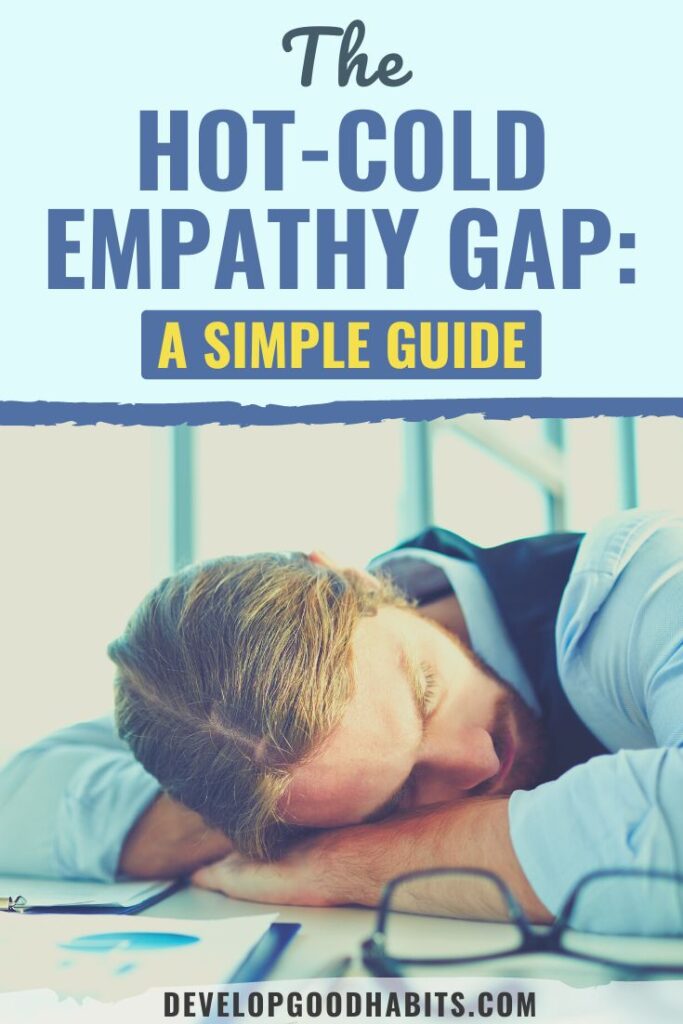Anyone who has ever tried to change a habit has probably experienced the “hot-cold empathy gap” at some point.
What is it? What ONE THING kills more habit changes than anything else?
What is the Hot-Cold Empathy Gap?
According to Wikipedia the hot-cold empathy gap is:
A cognitive bias in which a person underestimates the influences of visceral drives, and instead attributes behavior primarily to other, non visceral factors.
In layman’s terms, what the heck does that mean?
To put it simply, the hot-cold empathy gap (or HCEG) is a lack of understanding on the level temptation you’ll feel when encountering a trigger to do a bad habit.
In this post, we’ll talk about the HCEG, how it works and what to do when you experience it.
Before we proceed, take a few minutes to watch the video below which provides a quick overview of the hot-cold empathy gap and how it can often destroy your attempts to break a bad habit.
Examples of the Hot-Cold Empathy Gap
You can find examples of the HCEG in many places.
1. New Year’s Resolutions
Every year, people make a promise on December 31st that they’ll really change their life in the New Year. Usually they will commit to things like:
In other words, most people make a promise to reinvent themselves during the next 12 months.
But what usually happens after a few weeks?
Usually you ditch the promise after a few bad incidents.
For instance, here’s what usually happens:
The video below gives an overview of the “what the hell” effect and then I will give you 5 simple strategies you can use to overcome this negative mindset.
The point behind the HCEG is your best intentions will often fail in the harsh light of how much you desire to do the very habit you’re trying to eliminate. In psychology terms, your Superego is no match for your Id.
People tend to make promises (like on New Year’s Eve) that they can't keep when faced with a temptation. Even worse, they forget how alluring certain impulses can be.
2. Going on a Restrictive Diet
Let’s say you’re planning to stick to a restrictive diet. You make the promise to eat like a rabbit for the rest of your life—only healthy greens and low-starch vegetables for you.
From now on, you'll live gluten-free and never eat processed foods again. It’s fun to write down these goals because you're promising to turn into a new, better version of you.
This plan works great until you’ve eaten rabbit food for a few days and just got chewed out by your boss at the office. At that point, your willpower is cracking. It’s been a crappy day and all you want is a few slices of pizza. Suddenly the whole idea of healthy living, portion control and diet is forgotten.
In other words, your resolve to stick to a habit crumbled because you never accounted for those rough patches when temptation is really kicking in.
How to Defeat the Hot-Cold Empathy Gap
HCEG affects everyone, but it can be reduced—even eliminated—with a few different strategies:
#1: Understand ego depletion.
Willpower is like a muscle. It can be strengthened, but it can also get tired as the day goes on. That’s why it’s important to only work on one habit change at a time.
#2: Set reasonable goals, then recalibrate.
Understand you will be tempted at some point, so use this knowledge to your advantage. Rather than quitting cold turkey, try to slowly decrease your bad habit by 60%. One month later, reduce it down to 30%. And in the third month replace it with a brand-new good habit.
#3: Use “tools” to aid your willpower.
Some habit changes can be reinforced. Watching or listening to motivational speakers, TED Talks or motivational podcasts in this area can reinforce your willpower and reinvigorate your desire.
The important part is to understand you will be tempted and to take action beforehand to curb the temptation.
#4: Use a “bet” to motivate you.
I touched on this in my recent 30 day challenge to stop cursing. When you create a penalty for a habit change, you have an incentive stick to it.
A monetary penalty works when you know you won’t be perfect. It’s not the end of the world to break down and have five cigarettes in a week or eat three cookies in that same time span. What’s important is to “pay the price” for each misstep.
By sticking to a bet, you’ll experience a moment’s hesitation where you wonder if the habit is really worth the cost. Or as Timothy Olyphant’s character said in The Girl Next Door: “Always know if the juice is worth the squeeze.”
#5: Make a public commitment.
It’s pretty easy to lie to yourself. However, when your actions are out there for the world to see, you have to live up to their standards.
The simple solution is to use the Hawthorne effect to your advantage and make public commitments for every habit you’re trying to change.
These five ideas revolve around one core principle:
When planning a habit change, expect that temptations will happen. Moreover, realize that they’ll often pop up when your motivation and willpower is at its weakest state. Only when you understand your own limitations will you have a plan for overcoming them.
Final Thoughts on the Hot-Cold Empathy Gap
Understanding the hot-cold empathy gap allows you to recognize and bridge those gaps between your “hot” emotional states and your “cold” rational moments. Armed with this knowledge, you're better equipped to make wiser choices, cultivate empathy, and build more meaningful connections with others.
As you move forward, keep in mind that recognizing the gap is just the first step. Practice is key to improving your empathy and decision-making in the heat of the moment.
Whether it's in personal relationships, professional situations, or everyday encounters, being mindful of the hot-cold empathy gap can make a world of difference.
For other helpful resources to help you build better habits, be sure to check out these articles:
- Don’t Break the Chain: Jerry Seinfeld’s Advice on Sticking to a Habit
- How If-Then Plans Helps You Stick with a New Habit
- The Habit Loop: A Simple Guide on How Habits are Formed



S.J., I loved this post – especially how you took such a hard-to-understand topic and brought it back down to earth! The way I’ve tried to fight against HCEG (as much as I could, anyway) was to be as honest with myself as possible.
That’s much easier said than done, and I struggle a lot with it every day, but what has helped me is to reflect a ton on how my mind and body are feeling on a given day, especially relative to any willpower challenges I have that day. I’ll definitely give a few items on your list a go as well 🙂
Cheers!
Thanks Chris–appreciate it. I feel we all forget about HCEG. Even knowing about these concepts, it’s hard to remember what it’s like to feel tempted to during a habit change. I guess the key is to understand it happens and make sure you have an action plan for when those urges pop up.
Willpower is a big factor in any habit you want to break. I find that if I give myself a little reward then it is easier to break the habit. Rome wasn’t built in a day so it is important to not have too high expectations or you will fail. The other thing I do not beat myself up if I don’t stick to it a 100%. I just try to refocus and start again. Your points are good and well taken.
I love your point about not beating yourself up when you slip. I do believe you should stick to habits, but it’s not the end of world when you occasionally cave in. Just recognize that it’s a mistake and move on.
I personally want to face the temptations, I don’t want get around them. Face them, and focus, force my body and mind to resist the temptation.
I think the most important tip is setting reasonable goals. Take for instance: Losing weight. Most people tend to set their goal as just losing weight..or losing this much weight. They don’t divide the long term goal into many short term goals. I have made the mistake in the past, I won’t repeat it again 🙂
Anyways, I appreciate the tips, Scott 🙂 Thanks!
Yes, you’re right. It’s important to face temptations head on. Recognize they happen and know what you’ll do when they occur.
SJ, New Year’s resolution is such a great example!
I had similar struggle, altough it wasn’t at the beginning of the year. I decided to talk to a stranger every day.
And I discovered I’m unable to do it. Simply. So I took the detour: first practicing to make eye contact, then smiling, chiping in somebody’s chat… Now I talk to strangers about 2 days out of 3.
Find your Gap and make a detour! It works.
That is great! That is the thing with HCEG. I think a lot of people quit after not making it once. Like Perfection is the only thing possible. If you can strive for a goal, make it 80% of the time, work on improving that percentage, and above all KEEP IT GOING you are on the road to success for sure. Great job on your talking to strangers goal. It is a great one. Did something similar quite a few years back to help build my own confidence and ease in social situations.
This is something I’ve been noticing a lot lately. How one temptation can lead to a series of good habits falling by the wayside. If I feel down, I stop going to the gym which makes me more likely to eat badly. Then it just becomes a vicious circle that reinforces itself.
All it seems to take is one temptation. It reminds me of something Oscar Wilde once said, “I can resist anything except temptation.” It’s so hard to be good sometimes. But you’re exactly right that willpower is a muscle that you can build. So even if you give in to temptation once in a while, if you have a decent enough willpower, you can always get yourself back on track.
Steve,
Love the Wilde quote, it’s a good one.
Yeah, this and the “What the Hell” effect kill a lot of new habits. If you know it is going to happen, plan for and accept the occasional “oops” (as long as it is rare) you go a long way toward making those habits stick.